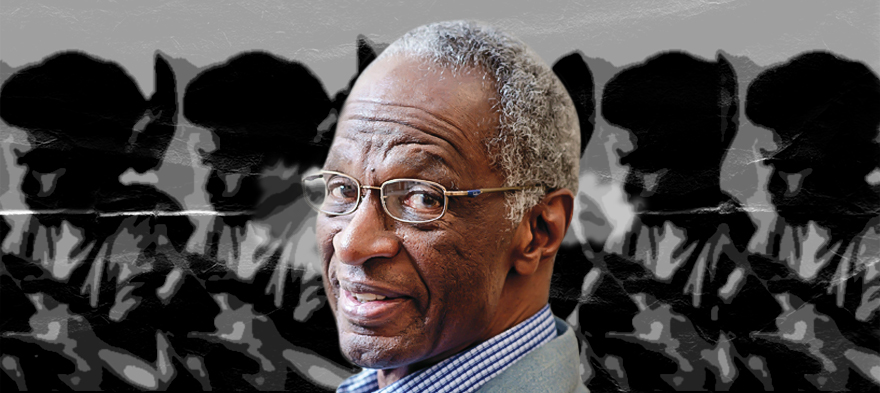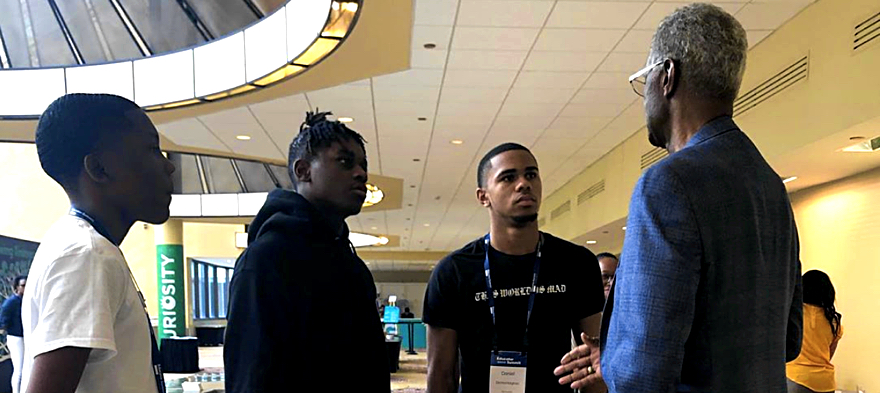
A few weeks ago, I attended a conference called Educator Summit in Philadelphia. I’m not much of a conference attendee and didn’t know exactly what to expect.
I stood in the back of a dimly lit ballroom, waiting for an address from a man named Howard Fuller, a name that rang familiar, but of whom I had little real knowledge.
From the moment Dr. Fuller took the stage, I was transfixed by his words, his passion and his fearlessness to speak truth to power. At the end of his talk, I plucked up the courage to approach him and ask him a question that’s been on my mind for a good long while: What should White, anti-racist co-conspirators say to other White people?
Dr. Fuller, who I later learned was the distinguished professor of education and founder/director of the Institute for the Transformation of Learning at Marquette University and author of "No Struggle No Progress," answered me with patience, kindness and unwavering honesty.

He told me that White people need the humility to understand that helping is not the same as controlling. Not only should we not assume the lead, we must also possess and exercise the humility to be told what to do, what is best, what is right—and what is wrong.
We need to help support communities gain the power to control their own destiny, not “help” them by assuming that control for ourselves.
And we need to be honest.
[pullquote position="right"]If who we truly are does not allow us to teach, support, care, love and fight for Black and Brown kids, then we need to go do something else.[/pullquote]
These were not easy things for me to hear. I was triggered, defensive and unsure. Which was precisely the reaction that demonstrated how comfortable I had been telling others what to do and how to be, but how little experience I, as a White man, had being on the opposite side of the conversation.
And I don’t think I’m alone.
I’m thinking of well-meaning school networks that educate student bodies that are nearly 100% Black or Brown, and are also run by boards and funders who are nearly all White, and who can make a whole lot of money doing so.
I’m thinking of cohorts of young White teachers entering classrooms with dreams of saving young Black and Brown children, who then advocate for those same students being suspended or removed for rough-housing, talking back and being disrespectful with nary a twinge of irony.
I’m thinking of myself as a young English teacher passing judgment on rap songs I felt were inappropriate, passing judgment on families based upon how they dressed and spoke and passing judgment on books I thought weren’t worthy enough to be taught or included in the canon.
Who the hell did I think I was?
So often, we White people look outward when we want to be agents of social change. We look outward when we want to be anti-racist co-conspirators. We look outward when we want to be so-called progressives at the forefront of social justice.
We are so quick to laud the virtues of grit, self-control and growth mindsets; to tell families in Black and Brown communities that their children need grit, that their children need self-control, that their children need growth mindsets.
But what about ourselves? What about our children?
Do we really value kindness if it is more important for my child to get a 5 on her AP test than it is to be decent?
Do we really value growth mindsets when we just assume some kids can’t read, or can’t do math or that some families don’t care?
Do we really have the gall to tell Black and Brown communities that their kids need grit when their children likely have more grit in one fingernail than we may have in our entire bodies?
Again, this is not easy to hear. I’m struggling even as I’m writing this.
But the struggle tells me that this is truth.
After all, if our passion as White anti-racist co-conspirators isn’t rooted in humility, love and respect for communities of color; if we don’t love the kids when they’re hard to love, if we only see the cultures and communities of urban students as impediments to replace rather than assets to encourage, then our classrooms and school hallways are likely to resemble areas of continued persecution, not empowering scenes of liberation.
[pullquote]There is a difference between serving a community and controlling a community[/pullquote]; between empowering a community to help them control their own destiny, and dictating that destiny.
Those of us, myself included, who choose to serve these communities need to understand these truths if we want to ensure that our schools and classrooms are places of liberation, not oppression.
I didn’t start my career with these beliefs. It’s been a long road of learning—one that will never end.
Zachary Wright is an assistant professor of practice at Relay Graduate School of Education, serving Philadelphia and Camden, and a communications activist at Education Post. Prior, he was the twelfth-grade world literature and Advanced Placement literature teacher at Mastery Charter School's Shoemaker Campus, where he taught students for eight years—including the school's first eight graduating classes. Wright was a national finalist for the 2018 U.S. Department of Education's School Ambassador Fellowship, and he was named Philadelphia's Outstanding Teacher of the Year in 2013. During his more than 10 years in Philadelphia classrooms, Wright created a relationship between Philadelphia's Mastery Schools and the University of Vermont that led to the granting of near-full-ride college scholarships for underrepresented students. And he participated in the fight for equitable education funding by testifying before Philadelphia's Board of Education and in the Pennsylvania State Capitol rotunda. Wright has been recruited by Facebook and Edutopia to speak on digital education. In the wake of the COVID-19 pandemic, he organized demonstrations to close the digital divide. His writing has been published by The Philadelphia Inquirer, The Philadelphia Citizen, Chalkbeat, Education Leadership, and numerous education blogs. Wright lives in Collingswood, New Jersey, with his wife and two sons. Read more about Wright's work and pick up a copy of his new book, " Dismantling A Broken System; Actions to Close the Equity, Justice, and Opportunity Gaps in American Education"—now available for pre-order!
If you have a child with disabilities, you’re not alone: According to the latest data, over 7 million American schoolchildren — 14% of all students ages 3-21 — are classified as eligible for special...
The fight for educational equity has never been just about schools. The real North Star for this work is providing opportunities for each child to thrive into adulthood. This means that our advocacy...
The story you tell yourself about your own math ability tends to become true. This isn’t some Oprah aphorism about attracting what you want from the universe. Well, I guess it kind of is, but...
Your donations support the voices who challenge decision makers to provide the learning opportunities all children need to thrive.
Ed Post is the flagship website platform of brightbeam, a 501(c3) network of education activists and influencers demanding a better education and a brighter future for every child.
© 2020–2024 brightbeam. All rights reserved.